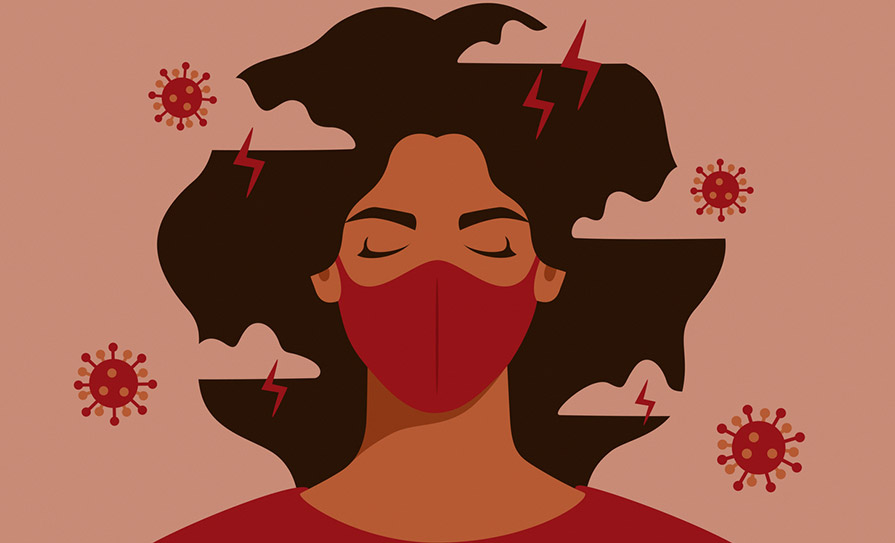Prof Brendan Kelly and Prof Gautam Gulati discuss the longer-term consequences of the pandemic, including ‘Post-Covid-19 syndrome’
The Covid-19 pandemic has brought extensive changes to the lives of everyone around the world. Even people who do not contract the virus themselves find their worlds transformed: Family members ill or deceased, public health restrictions limiting activities, lives and livelihoods under threat, and free-floating anxiety everywhere. It is an extraordinary time, not least because of the prominence that personal and public health have taken in our day-to-day lives. Issues relating to personal and social responsibility dominate the airwaves, and everyone has learned a new language, from ‘flattening the curve’ to the ‘R number’.
This article focuses on certain aspects of the impact of the pandemic on mental health and, especially, the longer-term psychiatric consequences of infection with Covid-19. In particular, it explores the concept of ‘post-Covid-19 syndrome’, which is increasingly recognised as one of the potential sequelae
of acute Covid-19.
Covid-19 and mental health
Unsurprisingly, the Covid-19 pandemic has had a substantial impact on mental health. Evidence to date indicates that the combined effects of the pandemic itself and the public health restrictions it necessitates have resulted in approximately one person in every five in the general population experiencing significantly increased psychological distress.1 This distress commonly manifests as anxiety, stress and symptoms of depression.
The rate of this distress is remarkably consistent across countries, cultures and various different settings. In some ways, we are more similar than we think, especially when confronted with a common challenge, such as the pandemic. Even so, particular risk factors for poor mental health during Covid-19 have been identified, including being female and living alone. This is an especially difficult time for people who had limited social connections prior the pandemic. The advent of Covid-19 has had a particular impact on them as a result of quarantine orders, social distancing and general limits on services and interactions. They require additional support.
Among healthcare workers, rates of psychological distress during the pandemic are approximately double those in the general population. Much of this distress is understandable in the context of the medical emergency triggered by the virus. This has led to longer working hours for many healthcare workers, changing shift patterns, increased pressures in the workplace, and ongoing concerns about infection. These are in addition to further pandemic-related complexities in the personal lives of healthcare and other workers as a result of restrictions, school closures, family members falling ill, and all of the other consequences of the public health emergency.
Regrettably, many of the steps required to alleviate these problems among healthcare workers are more difficult in a pandemic: Careful rostering, ability to take leave, organisational support from employers, and ‘psychological first aid’ for those in distress. Despite the challenges, all of these measures can help to ameliorate the pressures faced by healthcare workers and other frontline staff, once they are supported by specialist mental healthcare for people who are in particular need. Collegial support is especially important during these difficult times.
In addition to the general stresses of the pandemic, and those specific to healthcare workers, Covid-19 infection itself impacts on mental health in both the short-term (ie, anxiety, depression) and the longer term, especially among those who are hospitalised. These longer-term consequences can include persistent anxiety, post-traumatic stress, post-viral syndromes and various other manifestations of poor mental health.
People with pre-existing mental illness are at particular risk of infection with Covid-19 and require additional support both during the pandemic and in its aftermath. Often, people with chronic mental illness experience difficulty accessing regular health services and preventive care, both of which are especially important at this time.
Mental health and post-Covid-19 syndrome
From the outset, it was clear that the Covid-19 pandemic was likely to affect mental health significantly.2 What is increasingly apparent, however, is that ‘post-Covid-19 syndrome’ is more common and more potentially disabling than many might have expected. In addition, it is also now clear that this syndrome has significant psychological and psychiatric dimensions that merit close attention and careful management. While information is still relatively scarce, it is useful to reflect on what we know at this point. More information will surely follow.
Within the first year of the pandemic, many clinicians observed that some Covid-19 patients had persistent symptoms of the infection, even after the acute illness had improved and the patient had apparently recovered.3 Common persisting symptoms included fatigue, shortness of breath, joint pain, chest pain and diminished quality of life. It is now clear that, for many patients, these lingering effects of the virus are substantial, disabling and persistent.
In light of a growing body of evidence along these lines, the UK’s National Institute for Health and Care Excellence (NICE) published an up-to-date Covid-19 Rapid Guideline: Managing the Long-Term Effects of Covid-19 in November 2021, in collaboration with the Scottish Intercollegiate Guidelines Network (SIGN) and the Royal College of General Practitioners (RCGP).4 This guidance provides as much clarity as is possible at the moment, given the evolving state of evidence in this field. Experience with the longer-term effects of Covid-19 is necessarily limited, but knowledge is growing every month.
One of the most useful parts of the guidance from NICE, SIGN and RCGP is its clarification of the terminology used to describe the persistent effects of Covid-19. The document states that post-Covid-19 syndrome is present when signs and symptoms that develop during or after an infection consistent with Covid?19 last for more than 12 weeks and are not better explained by an alternative diagnosis. Often, there are clusters of symptoms, which commonly overlap, can fluctuate, can change over time, and can impact on any body system.
The term ‘long Covid’ describes signs and symptoms that continue or develop after acute Covid?19 infection, and this term therefore includes both ongoing symptomatic Covid?19 (from four-to-12 weeks) and post?Covid?19 syndrome (12 weeks or more).
Among healthcare workers, rates of psychological distress during the pandemic
are approximately
double those in the general population
The epidemiology of post-Covid-19 syndrome
At this point, more than 250 million people around the world have been infected by Covid-19 (with numbers currently rising, particularly in China). Over five million have died. These statistics are likely to be underestimates, owing to difficulties with diagnosis in many places, suboptimal health services in certain parts of the world, and uneven reporting systems. Future studies are likely to determine that the incidence was higher.
Even based on the figures we have today, however, it is clear that some hundreds of millions of people will be at risk post-Covid-19 syndrome after this pandemic ends. The implications for public health are enormous. The prominence of psychological and psychiatric symptoms in this syndrome suggests that the implications for public mental health will form an especially challenging part of the work that lies ahead.
With this in mind, it is important to establish precisely how common post-Covid-19 syndrome is, in order to estimate future healthcare needs. One cohort study followed up 277 Covid-19 patients and identified post-acute Covid-19 syndrome in 50.9 per cent of them between 10 and 14 weeks after disease onset.5 Radiological and spirometric changes tended to be mild and were found in less than 25 per cent of patients. By way of contrast, over one-third of these patients experienced fatigue and two-thirds of those with post-acute Covid-19 syndrome reported diminished quality of life. Clearly, this is a syndrome with substantial psychological and neuropsychiatric components that are significantly disabling for many sufferers.
Symptoms of poor mental health are present even in the early stages after acute infection. Studies conducted two weeks after physical recovery from Covid-19 detect high levels of anxiety (22 per cent), depression (21 per cent), and post-traumatic stress disorder (20 per cent) among patients.6 Over one-third (36 per cent) report psychological distress, and a similar proportion (35 per cent) have sleep disorders. These problems appear to be more common among survivors of Covid-19 than certain other infections. Rates of anxiety and depression following Ebola, for example, are 14 per cent and 15 per cent, respectively, compared to 22 per cent and 21 per cent with Covid-19. It is not entirely clear why Covid-19 is especially corrosive of mental health, but it is.
To compound matters, these psychiatric sequelae of Covid-19 tend to persist. In the first six months after infection, one-third of patients have a neurological or psychiatric diagnosis, increasing to almost half (46.4 per cent) of those admitted to intensive therapy units.7 Anxiety disorders, in particular, are present in 17.4 per cent of all Covid-19 patients during this period, and 19.1 per cent of those admitted to intensive therapy units. Again, these problems appear more common following Covid-19 than other infections. For example, the risk of psychosis following Covid-19 is twice as high as it is following influenza. Again, Covid-19 presents a particular risk to mental health, even in its aftermath.
What to do?
Most healthcare professionals are familiar with different post-viral syndromes that affect our patients to varying degrees. The mental health consequences of Covid-19, however, appear especially common and severe, and therefore the challenges to mental health services and public mental health will be even greater. Even the bare numbers of people affected by Covid-19 are sufficient to confirm that post-Covid-19 syndrome will be a health issue of the greatest magnitude in the years ahead.
So, what can we do now?
There are three things
In the first instance, adhering to public health guidance, promoting vaccination, and supporting good general health are all important preventive measures for Covid-19 in the first place. Prompt diagnosis and treatment of Covid-19 infection is also vital. The basics still matter and will hopefully prevent yet more people being at risk of post-Covid-19 syndrome in the future.
Second, we need to identify post-Covid psychiatric symptoms as early as feasible and provide appropriate multidisciplinary care. There is very little evidence about the usefulness of specific psychiatric treatments during the post-Covid period in particular, but the usual principles of bio-psychosocial psychiatry will clearly still apply.
Third, we need more data. Longitudinal studies are essential to better understand post-Covid-19 syndrome, calculate its incidence, estimate the public health impact, and — hopefully — identify specific interventions that work. The need for information has never been greater. Now that this syndrome is recognised, this information can hopefully be gathered and used to relieve the considerable suffering associated with the condition.
Author: Prof Brendan Kelly, Professor of Psychiatry, Trinity College Dublin, and Prof Gautam Gulati, Consultant Forensic Psychiatrist and Adjunct Professor at the University of Limerick. Prof Kelly is author of The Science of Happiness: The Six Principles of a Happy Life and the Seven Strategies for Achieving It (Gill Books, 2021).
Prof Gulati is co-author of Psychiatry Algorithms in Primary Care (Wiley-Blackwell, 2021).
References
1. Kelly BD. Impact of Covid-19 on mental health in Ireland: evidence to date. Ir Med J 2020; 113: 214-7.
2. Cullen W, Gulati G, Kelly BD. Mental health in the Covid-19 pandemic. QJM 2020; 113: 311-2.
3. Mahase E. Covid-19: What do
we know about ‘long Covid’? BMJ 2020; 370: m2815.
4. National Institute for Health and Care Excellence (NICE), Scottish Intercollegiate Guidelines Network (SIGN), Royal College of General Practitioners (RCGP). Covid-19 Rapid Guideline: Managing the Long-Term Effects of Covid-19. London, National Institute for Health and Care Excellence, 2021.
5. Moreno-Pérez O, Merino E, Leon-Ramirez J-M, Andres M, Ramos JM, Arenas-Jiménez J, et al. Post-acute Covid-19 syndrome. Incidence and risk factors: a Mediterranean cohort study. J Infect 2021; 82: 373-8.
6. Khraisat B, Toubasi A, AlZoubi L, Al-Sayegh T, Mansour A. Meta-analysis of prevalence: The psychological sequelae among Covid-19 survivors. Int J Psychiatry Clin Pract 2021: 1-10. [Epub
ahead of print].
7. Taquet M, Geddes JR, Husain M, Luciano S, Harrison PJ. 6-month neurological and psychiatric outcomes in 236?379 survivors of Covid-19: A retrospective cohort study using electronic health records. Lancet Psychiatry 2021; 8: 416-27.







